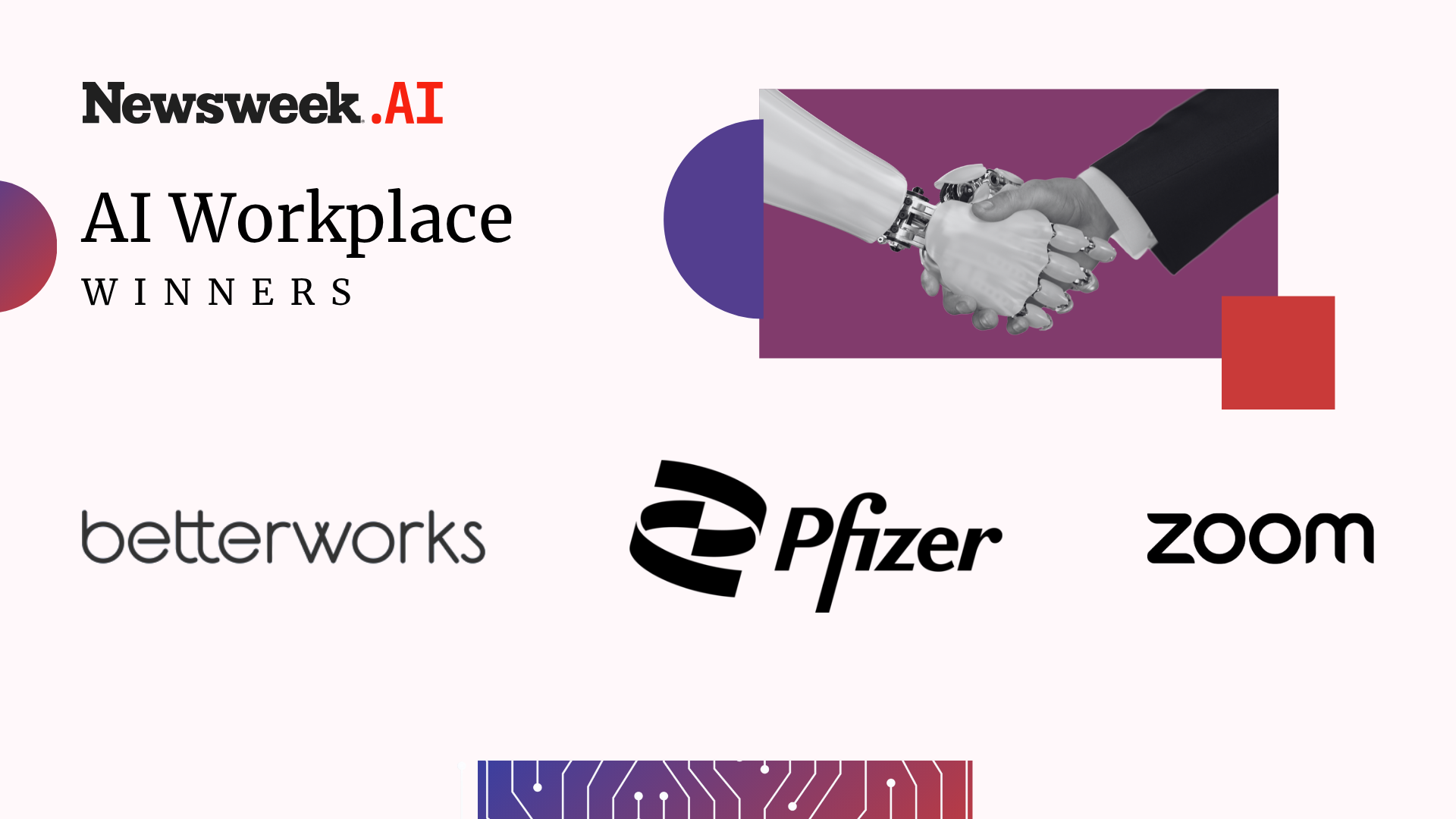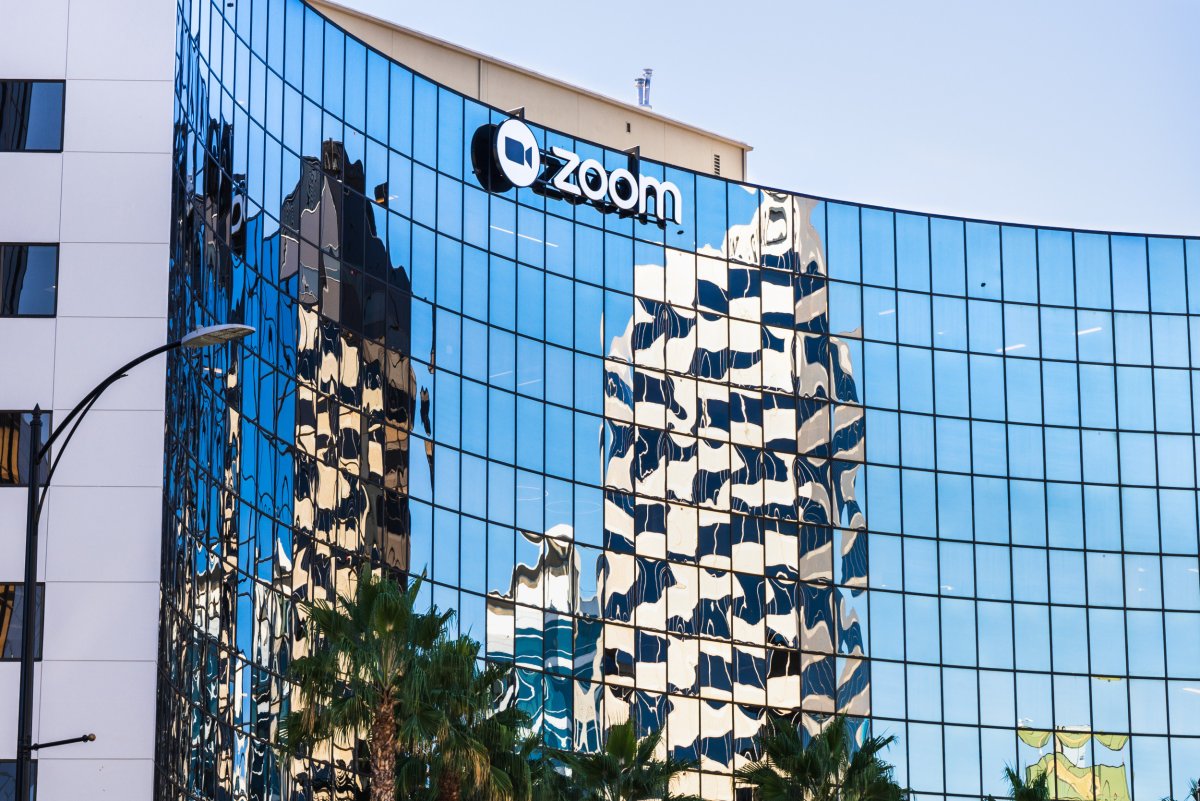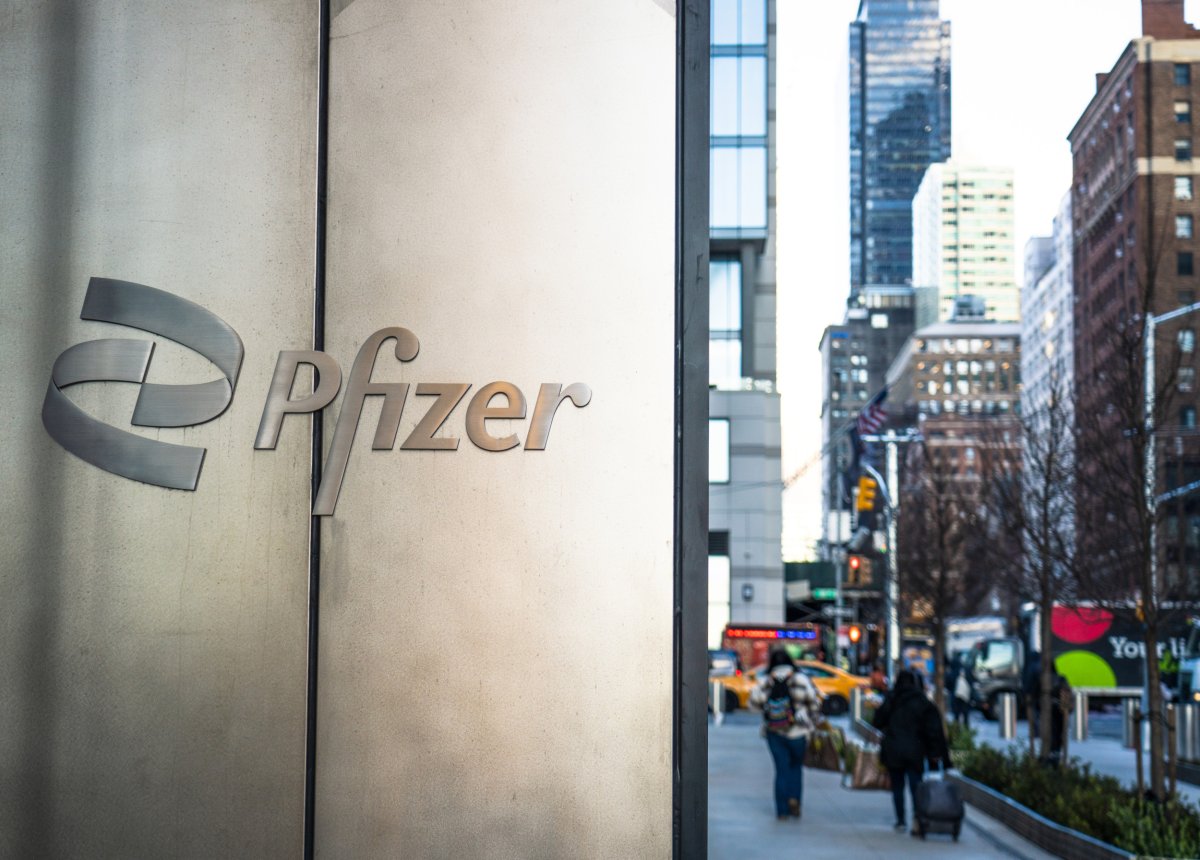
The impact of AI in the workplace is already profound, but that impact is expected to grow exponentially in the coming years, as recent breakthroughs have accelerated the vision for an AI-powered future of work.
“AI’s been around for a long time, but when ChatGPT hit the scene, it really captured everyone’s imagination,” Cheryl Johnson, chief product officer at Betterworks, said.
Over the last year, we have seen an expansion in agentic and generative AI tools aimed at helping people save hours per day or week at work by automating reports, summarizing meetings, writing first drafts, improving drafts and helping people and teams stay on top of their performance and development goals.
Best-in-class innovations in workplace AI are highlighted by Newsweek‘s AI Impact Award winners in the workplace categories: Zoom, Pfizer and Betterworks. Their new offerings are enabling smoother collaboration, reductions in meetings, improved goal-setting, time-saving for managers and better adoption of emerging technology.
Workplace tools were just one industry represented. Across more than a dozen categories, 38 winners were selected by a panel of judges made of AI and subject matter experts.
Newsweek Illustration
“Hybrid and remote work have become super noisy,” Smita Hashim, head of product at Zoom, told Newsweek. “How can we help people really automate away some of the more mundane things which they have to do, so they can focus on more strategic work, so they can focus on connecting with each other? That’s where we want to take AI Companion.”
Better Performance Management
Many are trying, but the performance management process remains a heavy burden for managers and direct reports, with many struggling to see the value in the process or in their ability to communicate the breadth and value of their accomplishments over the course of a year.
At Betterworks, the solution was to address certain pain points in performance management with an AI tool to support goals that give feedback and prompt manager conversations around goals.
“AI was used not to replace people but to enhance them—acting as a copilot to guide goal-setting, feedback and performance conversations. The objective was to free employees from administrative overload and focus their energy on growth, development and productivity. The result? More relevant and meaningful feedback to drive employee engagement and better data for HR teams to understand their workforce,” a representative wrote in the company’s award application.
One of the organizations using Betterworks, the software company LivePerson, drove a 30 percent improvement in timely completion of performance reviews, and its employees reported 75 percent less time spent to complete them. Managers and employees also reported improved clarity and tone in performance feedback, in addition to value.
“We saw immediate positive response for, especially, employees who were maybe not as great with communication,” Johnson shared. “They felt like they could put their notes in, and it would be transformed into something that was more on point.”
For managers, especially those with 10 or more direct reports, reviewing goals for every employee and writing feedback can be incredibly time-consuming. Having the ability to give feedback to employees as they set their goals can prevent multiple rounds of edits with the manager and ensure better alignment with team and company goals.
“The friction point is the blank page,” Johnson said. “With Goal [AI] Assist, you click one button, and it’s looking at your job title, past goals, company goals, your manager’s goals. It’s looking at all this information in the system. It’s looking at your past feedback, your past feedback from your manager, and recommending professional and development goals.”
Before rolling out Betterworks, the team at LivePerson, an AI chat company itself, put a stress test on the technology as a means of vetting the new AI offering.
“They build AI technology themselves, so they’re pretty savvy,” Johnson shared. “They had their team come in and essentially try to break our AI. They gave it some challenging scenarios to see what the response would be.”
After passing the stress test, LivePerson shared those results internally as it deployed the Betterworks tool to help its workforce know that it was thoroughly vetted.
“You have employees really being supported to fire on all cylinders and show up as their best because they have clarity on what’s expected, how they’re performing, what the gaps are, how they might fill those gaps,” Johnson said.
In the future, Betterworks plans to expand on this offering with a “robust data set” around succession planning and “a manager homepage that kind of leads all the insights from the platform for their team and pulls out the same endpoints and allows them to take immediate and quick action on those points,” Johnson said.
As middle managers report rising burnout and trouble managing conflict across expectations between workers and executives, finding ways to save them time and manage better can pay large dividends.
“We think a lot about the manager, and how to help them shine, really, fundamentally, is at the crux of what we’re doing,” Johnson said.

Getty Images
A Companion for Collaboration (and Fewer Meetings)
The company that allowed many organizations to stay in touch and keep having meetings during lockdown has been working hard to make the meeting experience richer over the last few years, launching whiteboarding tools, live transcripts and added privacy and communication features. With the launch of Zoom AI Companion, people can attend fewer meetings while having more impactful communication with colleagues, and the AI tool can also help set tasks and calendar events during or after meetings.
“How can you be more effective in your meetings, but how can you also maybe not have meetings if you don’t need to have them? AI Companion does an amazing job summarizing meetings and converting it into next steps as well,” Hashim said.
Zoom also made AI Companion available at no extra cost to its enterprise users, to allow companies the widest possible aperture for experimentation and discovery around the possibilities of AI in different employees’ workflow.
During meetings, users can ask Companion questions on the side, like if they missed a segment of what was said or want to search the web for information to share in the meeting. Like a lot of the traditional generative AI tools, Companion is also helping employees across the board with first drafts of emails, outlines or memos and can incorporate information from meetings and other company documents to help build those drafts.
“We are focused a lot on the process that we call ‘from conversation to completion,’ so you’re having all these conversations. But then, how can you complete the work or how can you get more out of these conversations?” Hashim said.
Zoom users in finance, sales, customer service, operations, HR, IT and product management are developing their own use-cases for how they can benefit from this tool. In most cases, it is being used to synthesize large amounts of information that they need to summarize and communicate to other parties.
The speed of collecting and summarizing information that may be readily available in company documents and meeting summaries can have a profound impact on productivity and innovation. Hashim notes that some features are aimed at the general productivity of any employee, but all functions have different ways of collaborating that can be supported by AI Companion.
Finance managers can collect reports from a variety of sources and ask prompts of the AI to determine their next steps for work rather than having to review all of the documentation. Product teams can collect user data and feedback and summarize it faster to accelerate their iteration cycles. Sales and account management teams can summarize their calls and get actionable feedback for product teams and client service plans.
“We have a prompt library, which users can use in order to discover different ways of working with Companion,” Hashim said. The company also makes best practices available.
Among Zoom clients, 60 percent of its Fortune 500 users have AI Companion enabled. Gainsight, a customer success platform, noted that AI Companion offered the functionality of a premium AI assistant tool within a software it already has and uses, while also enabling privacy and data security in customer communications. Cloud security company Zscaler enabled AI Companion for all employees and reports healthy adoption with minimal training as well as success with customer-facing teams. BairesDev, one of the largest fully remote companies in the world, estimates it has saved employees over 19,000 hours with AI Companion since November 2023.
“We will see a lot more people being able to do a lot more effective work and lot more strategic work in ways that are more relaxing and more energizing for them,” Hashim said.
AI Training Program
Pfizer developed a proprietary generative AI platform called Vox, a tool meant to help its pharmaceutical and biotechnical development teams with functionality, like drafting patents, generating code and identifying new business opportunities. The company also made Microsoft‘s Copilot available to employees.
Pfizer representatives told Newsweek that “despite Vox and Copilot’s extensive functionalities, Pfizer encountered challenges in conveying the value and driving the adoption of these new technological tools to its workforce.”
The biopharma giant responded with the creation of a learning program “aimed at helping novice users grasp the concepts of artificial intelligence and generative artificial intelligence as well as the functionalities of Vox, Copilot and other tools available to all Pfizer employees.”
The program included introductory AI training, an “AI Academy” for those looking to reach mastery and external educational opportunities. Over 12,000 company employees have begun training with the academy, representing over 15 percent of Pfizer’s global workforce, with a 96 percent positive feedback rating from a survey of learners, and 250 employees have begun graduate programs in this domain through partnerships with the Stevens Institute of Technology. Pfizer has also put over 200 high-potential company leaders through leadership development programs that include AI training as part of the curriculum.

Getty Images
In partnership with a consulting firm, Pfizer built out this program by identifying four key milestones in the AI learning journey: Exploring AI, Understanding AI, Practicing AI and Mastering AI. They then set out to develop a variety of learning opportunities in a wide variety of formats, including workshops, nanodegrees, “prompt-a-thons” and role-based training. They also developed resources for specific roles and departments, such as the AI Academy for Finance and Global Business Services, and later tapped members of an internal AI Champion Network and other employee volunteers to create role-specific resources and training for the most popular AI Academy workshops.
Pfizer also put a special emphasis on launch and rollout with its Digital division, a group primarily consisting of tech workers. Today 46 percent of Pfizer Digital employees are active in AI Academy.
For less technically inclined employees, Pfizer addressed skepticism around AI with its training, created badge credentials to mark progress and developed placement exams for determining which training pathways to pursue, in addition to the role-based guidance and resources.
Pfizer also launched an in-person, three-day event called AI Academy Live for a more interactive experience that featured influential company speakers, including Yolanda Lyle, SVP and chief of staff to CEO Albert Bourla, and Mack MacKenzie, VP of Digital Client Partner, Business Innovation and PHI, “who discussed maximizing colleague potential through AI and ensuring a human-centered approach to AI transformation,” Pfizer representatives said.
Pfizer’s AI Strategy Framework Tier 1 AI Adoption was credited with $163 million in ROI, thanks to the support of AI Academy efforts, with the company finding that participants were 68 percent more likely to use Copilot than non-learners and also completed twice as many actions using the tool.
“Session has provided [me the] confidence to play around with GenAI tools and begin embracing these tools in my day to day,” one of the participants wrote in their feedback. “Thank you for creating a fun, interactive Unlocking GenAI Potential training session! I can’t wait to put this training to use and see the limitless potential of using AI in real-world applications.”
To see the full list of AI Impact winners, visit the official page for Newsweek’s AI Impact Awards.
Newsweek will continue the conversation on meaningful AI innovations at our AI Impact Summit from June 23 to 25 in Sonoma, California. Click here to follow along on the live blog.
